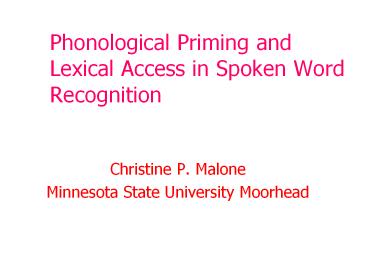Phonological Priming and Lexical Access in Spoken Word Recognition - PowerPoint PPT Presentation
Title:
Phonological Priming and Lexical Access in Spoken Word Recognition
Description:
Phonological Priming and Lexical Access in Spoken Word Recognition Christine P. Malone Minnesota State University Moorhead Problems Under Investigation How do the ... – PowerPoint PPT presentation
Number of Views:420
Avg rating:3.0/5.0
Title: Phonological Priming and Lexical Access in Spoken Word Recognition
1
Phonological Priming and Lexical Access in Spoken
Word Recognition
- Christine P. Malone
- Minnesota State University Moorhead
2
Problems Under Investigation
- How do the processes occurring during early
stages of spoken word recognition affect
single-word shadowing (naming) performance? - How is a string of incoming phonetic features
mapped onto a remembered lexical item? - How does phonological information influence the
organization of lexical items in memory?
3
Background on Activation
- During spoken word recognition, listeners
automatically evaluate the unfolding input by
activating a set of potential lexical candidates,
which then compete for recognition. - The incoming sound pattern determines the
potential candidates. - Degree of activation is determined by match
between the potential candidates and the
unfolding sensory input.
4
Connectionist Models
- Difficulty obtaining facilitation following
beginning phonological overlap across different
tasks - Theoretical interest turned from cohort to
connectionist theory. - Multi-level architecture composed of simple
processing units, called nodes. Adapted from
visual word recognition.
5
Levels of Speech Processing
- Feature Level--Break the speech stream into
phonetic features, such as voiced/voiceless. - Phoneme Level--Interpret stream of features and
produce a prelexical representation. - Lexical Level--Identify the word.
6
A Simplified Connectionist Model(adapted from
Colombo, 1986)
INPUT
7
Levels of Speech Processing
- Feature LevelBreak speech into phonetic features
(e.g., voiced/voiceless) - Phoneme Level--Interpret stream of features and
produce a pre-lexical representation. - Lexical Level--Identify the word.
INPUT
8
Priming and the Naming Task
- Shadowing task (naming) involves lexical
processing, but is relatively unaffected by
postlexical processing. - Effect of having recognized the prime on
recognizing the target? - Phonological priming--assess differential levels
of residual activation when manipulating
phonological overlap and lexicality of prime.
9
Experiment 1 Stimuli
- Target motivate
- Match Mismatch
- Early Overlap motorist demote
- Late Overlap innovate atrium
- Unrelated vocalist vocalist
10
Hypotheses
- If inhibition takes place among beginning
phonemes, then Early Overlap/Match targets will
have longer latencies compared to Late
Overlap/Match targets. - If overall match (and not location) is important
in activation, then Mismatch pairs should show
same patterns as Match pairs.
11
Method
- Auditory priming paradigm, 100 ms ISI
- Single word shadowing (or naming) task, each list
contained 8 EM, 8 EMM, 8 LM, 8 LMM, and 8
Unrelated pairs. - Digitally recorded stimuli (22kHz, 16-bit) using
SoundEdit and presented via PsyScope. - Voice-activated reaction times recorded from
target onset until beginning of vocal response.
12
Graph
13
Shadowing Latencies
14
Conclusions
- Shared beginnings slowed naming of target
(inhibition) for word and nonword targets. - Potential candidates are inhibited based on
matching beginning information, supporting
connectionist architecture.
15
Applications
- Questions regarding the lexicon architecture have
important implications for how we understand and
model the word recognition system. - Empirical data is useful for scientists studying
language processing, as well as for scientists
developing speech recognition systems.
16
(No Transcript)






























